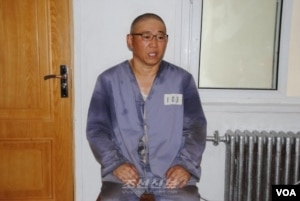by Eric M. Johnson 
Kenneth Bae, a US citizen imprisoned in North Korea for crimes against the state, made a fresh appeal to the US government for help and chronicled his declining health in a letter that reached his family on Wednesday, his sister said.
Bae was sentenced in early May to 15 years of hard labor after North Korea’s Supreme Court convicted him of state subversion, saying the 45-year-old Christian missionary had used his tourism business to form groups to overthrow the government.
Bae has been held since he was detained in November as he led a tour group through the northern region of the country. His sentencing came amid acrimonious relations between Pyongyang and Washington over the reclusive state’s nuclear aspirations.
“He said it is definitely getting harder for his body to withstand the day-to-day labor, but he is trying his best to be strong and hold on,” Bae’s sister, Terri Chung, told Reuters in an interview at her mother’s home in a Seattle suburb. The letter was written July 14.
Bae spends eight hours a day, six days a week planting and plowing fields of potatoes and beans among other work at a prison for foreigners near Pyongyang where he is kept largely isolated, Chung said.
A naturalized US citizen born in South Korea who most recently lived in China, Bae has back pain, an enlarged heart, hypertension and diabetes and his vision has started to blur, Chung said.
“His health is deteriorating and he asks us to have our government help to bring him home,” said Chung, who teaches English at a Seattle community college.
North Korea has in the past used the release of high-profile American prisoners as a means of garnering a form of prestige or acceptance, rather than economic gain, by portraying visiting dignitaries as paying homage to the country and its leader.
That pattern has complicated the response from US lawmakers and the State Department, which has called for Bae’s immediate release on “humanitarian grounds” but has resisted sending high-profile envoys to negotiate, as it has done in the past.
Reports last month that former US President Jimmy Carter was set to visit North Korea to negotiate for Bae were ultimately denied as false.
An Internet petition urging US President Barack Obama to secure “Special Amnesty” for Bae has garnered more than 7,000 signatures and Bae’s family plans a prayer vigil in Seattle on Saturday.
Bae has acknowledged being a missionary and has said he conducted religious services in the North. He has said he was moved by his faith to preach in North Korea, ranked for years as the nation most hostile to Christianity by Open Doors International, a Christian advocacy and aid group.
The random trickle of correspondence from Bae and the muted response from Washington have taken a toll on his tight-knit family in the United States. Chung said the family has received five sets of letters and two sets of phone calls – to his wife, mother and sister – in the nine months.
Chung declined to share the precise content of her brother’s letters or to confirm whether they had been screened by North Korean officials. She hoped to learn more from tourists who had traveled with Bae on forays into Rason, a special economic zone in the northern part of the country for foreign investors. Human rights activists in South Korea say Bae may have been arrested for taking pictures of starving children.
“I do remember him coming home from one of these trips in North Korea and talking about visiting orphanages and feeling just really compelled to help,” said Chung, sitting near a collection of family photos hung on the wall.
Chung, in exchanges brokered by the State department and a foreign embassy, has offered her brother bittersweet anecdotes about a Fourth of July celebration, a youth soccer tournament, and being so preoccupied with his arrest that the “tooth fairy” forgot for several days to swap money for her child’s detached tooth.
The family’s doctor sends medicine. Bae’s wife, in China, has sent toothpaste and shampoo. And his mother, Myunghee Bae, has sent clippings of bible verses.
The worst moment for Chung came when media producers asked her and her mother to confirm Bae’s identity in a still-image taken from prison interview footage before it was to be aired.
Bae, wearing a dirty, blue-gray prison uniform, looked “broken, diminished” and 30 to 40 pounds (14 to 18 kilograms) lighter.
“My mom just broke down into these sobs … it was so gut-wrenching,” she said.–Reuters



